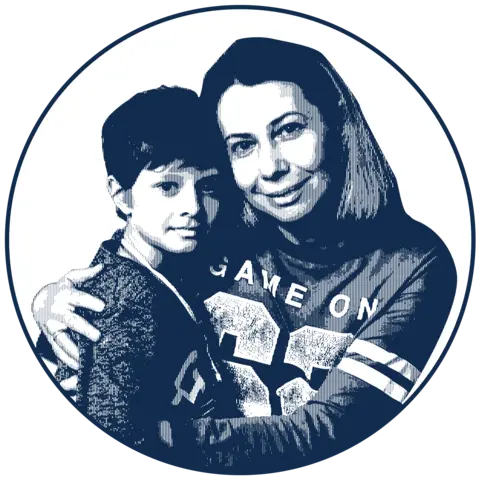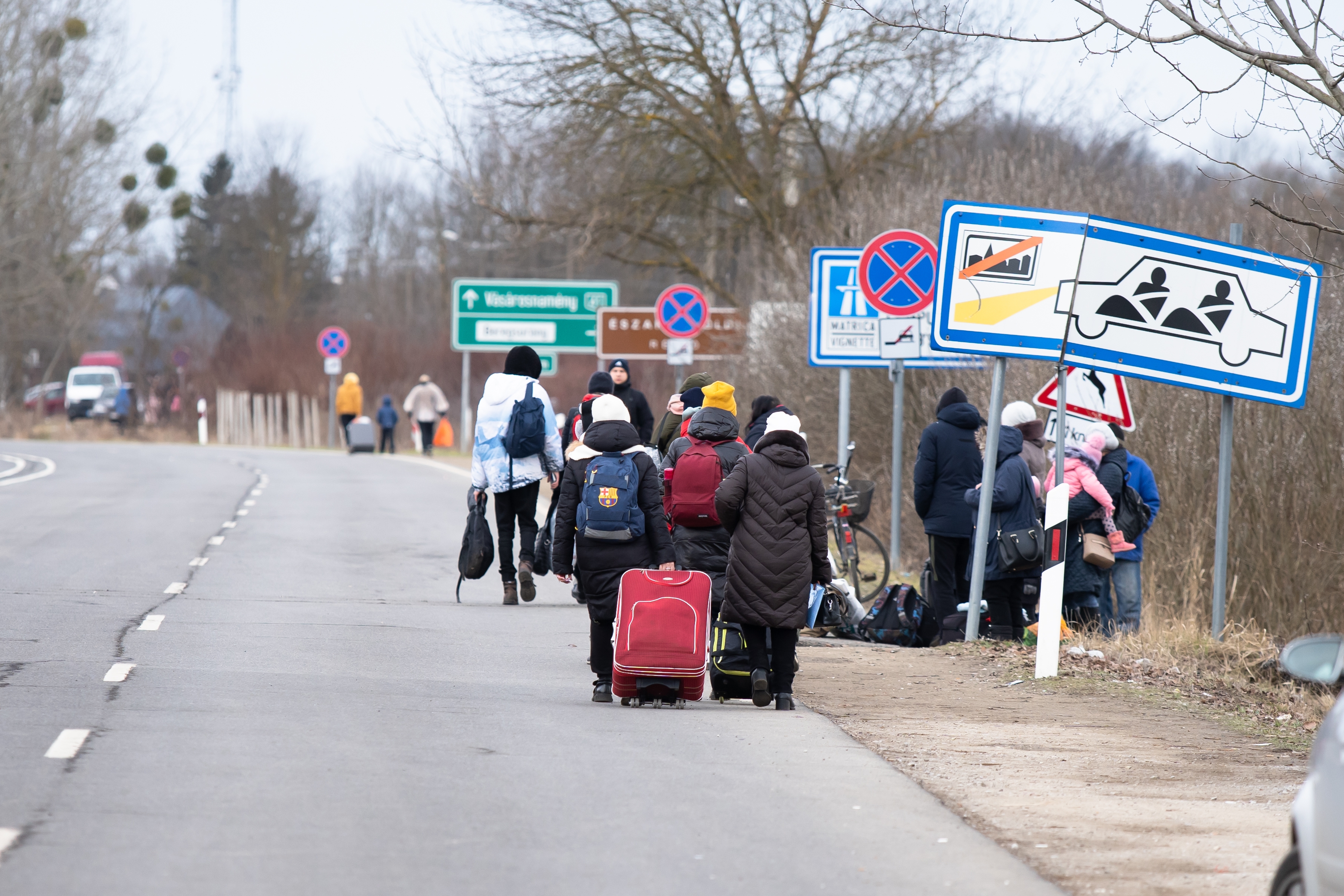Ukrainians' loyalties have sometimes been described as divided between those who speak Russian and Ukrainian, between those who want to maintain historical ties with Moscow and those who see a future in the EU and NATO. But a year after the Russian invasion, the war is crafting a new, united union in Ukraine. Nick Schifrin reports from Kyiv with the support of the Pulitzer Center.

As a nonprofit journalism organization, we depend on your support to fund coverage of global conflicts. Help us continue funding the hard costs of in-depth coverage of the Ukraine invasion—including travel, hostile environment safety training, and the increased security expenses that arise from reporting in war zones.
Read the Full Transcript:
Geoff Bennett: Continuing our series ahead of the one-year anniversary of Russia's full-scale invasion, Ukrainians' loyalties have sometimes been described as divided between those who speak Russian and Ukrainian, between those who want to maintain historical ties with Moscow and those who see a future in the E.U. and NATO.
But Nick Schifrin reports that, in war, Ukraine is crafting a new united union. He tells that story through three Russian-speaking cities and three Ukrainian mayors, starting in the south.
Nick Schifrin: In the first days of the war, Kryvyi Rih Mayor Oleksandr Vilkul got a phone call. The Russian official who'd assumed he would betray his country said, open the city gates.
Vilkul said: "Go (EXPLETIVE DELETED) yourself."
We met Vilkul last summer at a shelter for Ukrainians fleeing occupied territory. Before the full-scale invasion, he was a central figure in Ukraine's pro-Russian political party. He once ran for president backed by pro-Russian politicians.
Oleksandr Vilkul, Mayor of Kryvyi Rih, Ukraine (through translator): Listen, I have never been pro-Russia. I have been sanctioned by Russia since 2018.
Nick Schifrin: Vilkul has long denied supporting Russia, but, on Ukrainian TV, he routinely called the 2014 revolution that overthrew a pro-Russian president a coup. One of the revolution's leaders fought him in a studio.
But that was a different time, before Russia's total war to — quote — "liberate Russian speakers from Ukraine's Nazi government."
Oleksandr Vilkul (through translator): Russia mistakenly believed that those people in Ukraine who speak Russian or those who are Orthodox, it means that they love Russia. Putin made a huge mistake. The division that he created in the last few months will last for generations.
Nick Schifrin: And so what's the future of the relationship between the people of the city, this region, many of whom speak Russian, and Russia?
Oleksandr Vilkul (through translator): Does it matter which language we speak? We're Ukrainian. We're patriotic. With Russia, we don't have a common past. We just have a divided future.
Nick Schifrin: In Kyiv, the city cut in two a statue of a Soviet pilot and dismantled a Soviet general. The subway station currently named for Russian author Leo Tolstoy will soon be called Place of Ukrainian Heroes.
Ukrainians trace their identity back to the 10th century. But for more than 300 years, the Russian Empire and especially the Soviet Union undermined any distinct Ukrainian character. Ukraine gained independence in 1991, when the Soviet Union collapsed, and it is now breaking with its Russian and Soviet past, a process that started to accelerate in 2014 during Russia's initial invasion of Ukraine and annexation of Crimea.
When I was here in 2014, I got the sense that some residents of this city had sentiments toward Ukraine and some toward Russia. What are the sentiments of the residents of Kharkiv today?
Ihor Terekhov, Mayor of Kharkiv, Ukraine (through translator): 2014 and today are two different eras, as if a whole generation has passed.
Nick Schifrin: Ihor Terekhov is the mayor of Kharkiv. We also met him last summer. He says residents once proud of their Russian or Soviet heritage are now proud to be Ukrainian and horrified by the destruction and crimes that Russia has inflicted.
Ihor Terekhov (through translator): Yes, there were times when people wanted to be friends with Russia. Now what they have done here has changed people's perceptions 180 degrees, and what Putin did was, he turned the people of Kharkiv against him and against Russia.
Nick Schifrin: Three hundred miles south, Odessa is Southern Ukraine's largest city. It was founded in the late 18th century by one of Russia's greatest rulers, Catherine the Great, and was one of the Russian empire's most important ports.
And Gennadiy Trukhanov was a senior member of the same main political party with pro-Russian sentiments. But immediately after last February's full-scale invasion, he posed a rhetorical question in response to Putin's claimed defense of Odessa's Russian speakers: "Who the (EXPLETIVE DELETED) are you planning to defend here?"
Gennadiy Trukhanov, Mayor of Odessa, Ukraine (through translator): Today, Odessa has changed because we see what is happening in our country, how our Ukrainian cities are being destroyed. And we clearly understand who's doing that, Russian soldiers.
Serhii Plokhii, Harvard University: People got together, no matter what languages they speak, because they realized that Russia brings destruction.
Nick Schifrin: Serhii Plokhii is a professor of Ukrainian history at Harvard.
Serhii Plokhii: What we certainly witness today is an extremely important moment in the birth of a new Ukrainian nation and really formation of a new type of Ukrainian state.
Nick Schifrin: A hundred and sixty years ago, President Abraham Lincoln dedicated the Soldiers' Cemetery at Gettysburg, as read by an actor.
Actor: "We here highly resolve that these deaths shall not have died in vain, that this nation under God shall have a new birth of freedom."
Nick Schifrin: On New Year's Day, Ukrainian President Volodymyr Zelenskyy echoed Lincoln.
Volodymyr Zelenskyy, Ukrainian President (through translator): On February 24, we woke up to become a different people, a different Ukraine. The first rockets became a wakeup call. And we finally realized who was who, what our friends are capable of, what our enemies are capable of, but, most importantly, what we are capable.
Serhii Plokhii: Ukraine was born as an independent state in December of 1991, but the question was that there was a state that still had to acquire a nation.
What we see today is, that nation has been formed. It wasn't fighting for one particular language. It wasn't fighting for one particular religion. It was fighting for freedom.
Nick Schifrin: And Ukrainian soldiers are giving their lives today so that a new nation might live.
For the "PBS NewsHour," I'm Nick Schifrin in Kyiv.








